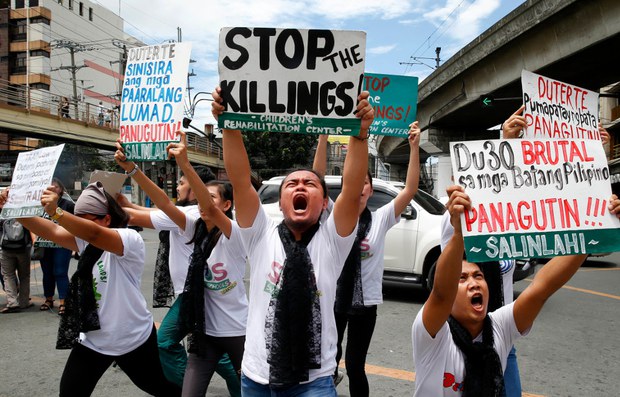Filipinos Prepare Protest to Commemorate Marcos Era Martial Law
2018.09.19
Cagayan de Oro, Philippines
 Protesters perform during a rally near the presidential palace in Manila to coincide with the filing of charges by Gabriela, a local women’s group, against Philippines President Rodrigo Duterte before the International Peoples' Tribunal, Sept. 19, 2018.
Protesters perform during a rally near the presidential palace in Manila to coincide with the filing of charges by Gabriela, a local women’s group, against Philippines President Rodrigo Duterte before the International Peoples' Tribunal, Sept. 19, 2018.
Updated at 1:30 p.m. ET on 2018-09-19
The influential Catholic Church in the Philippines called on the public Wednesday to join a protest this week to mark the anniversary of dictator Ferdinand Marcos’ imposition of martial law and to denounce the current president’s authoritarian tendencies.
Stressing that legal dissent had a place in Philippine society, Manila Auxiliary Bishop Broderick Pabillo said that in “a healthy democracy there should be a strong opposition to abuse of power.”
Pabillo was referring to the government of President Rodrigo Duterte, a self-described Marcos admirer whose anti-drug crackdown has left thousands dead since he took office in June 2016.
Pabillo, however, said the protest rally was not part of any destabilization plot, but was meant to project a “united stand” against the killings.
The protest is to coincide with the 46th anniversary of the day when Marcos placed the entire country under martial law in 1972. Thousands of activists were tortured or went missing, as Marcos and his family enriched themselves by raiding state coffers.
Duterte faces two criminal complaints with the International Criminal Court (ICC) for crimes against humanity, for deaths related to his administration’s war on drugs. But he has maintained that The Hague-based institution no longer has jurisdiction over him since his government withdrew from an international treaty that created the ICC in March.
He has also charged that political opponents, including the church, wanted to see him fail as part of a destabilization plot.
In 1986, a people-power revolution chased Ferdinand Marcos into exile in Hawaii, where he died three years later. But his family was subsequently allowed to fly home.
The Marcoses have since regained political clout, with widow Imelda Marcos, now a member of Congress representing the family’s northern district, where daughter Imee Marcos is a governor. Duterte has often publicly thanked Imee Marcos for contributing funds to his electoral campaign two years ago.
Ferdinand Marcos Jr., a former senator, lost in the vice presidential race, but his electoral protest is backed by Duterte, who has said he partially owed his presidency to the Marcos family.
The so-called protest on Friday was nothing more than a naked attempt at grabbing power, presidential spokesman Harry Roque said.
“From what I gathered, some groups are really cooking up a massive destabilization plot in time for the martial law anniversary,” Roque said.
Nardy Sabino, with the Promotion of Church People’s Response, an activist group, said Duterte’s “blood lust on his drug war has greatly impinged on the reputation and economic stability” of the country.
The drug war has killed about 4,410 suspected drug dealers and addicts in police operations since he assumed office in 2016, according to latest figures released last week by the national police.
The figure is on top of the estimated 4,800 others that are considered “deaths under investigation” – including those blamed on unidentified vigilantes who typically leave messages on cardboard placed near the bodies of victims, warning others to avoid drugs or end up dead.
Rights groups, including Human Rights Watch and Amnesty International, have placed the death toll at 12,000 or higher, largely because many deaths, especially in slum areas, sometimes go unreported.
“We must stand for truth and force the Duterte administration to account for human rights violations and the mismanagement of the economy,” said Sabino, referring to the president’s drug war.
Jeannette Cawiding, of the Alliance of Concerned Teachers, said she was greatly worried after finding out that she and seven other colleagues were on a list of alleged terrorists kept by the Department of Justice.
“This is dangerous,” she said. “We could suffer the same fate as victims of war on drugs. We are under surveillance and are being profiled for various reasons.”
“Activism is not a criminal act. We do this as good citizens, teachers and Christians because we’re making creating a society where genuine peace and justice prevails,” she said.
Neither Roque nor Philippine justice officials replied to requests from BenarNews seeking comment on Cawiding’s claim.







